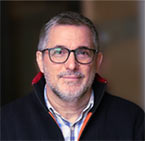Member Highlight: Prof. Fernando Pereira

Member Highlight: Prof. Fernando Pereira
Professor, Instituto Superior Técnico - Universidade de Lisboa,
and Instituto de Telecomunicações
 Fernando Pereira is a Full Professor at the Department of Electrical and Computers Engineering of Instituto Superior Técnico, University of Lisbon, and a Senior Researcher at Instituto de Telecomunicações, Lisbon, Portugal. He is or has been Associate Editor of IEEE Transactions of Circuits and Systems for Video Technology, IEEE Transactions on Image Processing, IEEE Transactions on Multimedia, IEEE Signal Processing Magazine and EURASIP Journal on Image and Video Processing, and Area Editor of the Signal Processing: Image Communication Journal. In 2013-2015, he was the Editor-in-Chief of the IEEE Journal of Selected Topics in Signal Processing.
Fernando Pereira is a Full Professor at the Department of Electrical and Computers Engineering of Instituto Superior Técnico, University of Lisbon, and a Senior Researcher at Instituto de Telecomunicações, Lisbon, Portugal. He is or has been Associate Editor of IEEE Transactions of Circuits and Systems for Video Technology, IEEE Transactions on Image Processing, IEEE Transactions on Multimedia, IEEE Signal Processing Magazine and EURASIP Journal on Image and Video Processing, and Area Editor of the Signal Processing: Image Communication Journal. In 2013-2015, he was the Editor-in-Chief of the IEEE Journal of Selected Topics in Signal Processing.
He was an IEEE Distinguished Lecturer in 2005 and elevated to IEEE Fellow in 2008 for “contributions to object-based digital video representation technologies and standards”. He has been elected to serve on the IEEE Signal Processing Society Board of Governors in the capacity of Member-at-Large for 2012 and 2014-2016 terms. He has been IEEE Signal Processing Society Vice-President for Conferences in 2018-2020 and IEEE Signal Processing Society Awards Board Member in 2017. He was the recipient of the 2023 Leo L. Beranek Meritorious Service Award.
Since 2013, he is also a EURASIP Fellow for “contributions to digital video representation technologies and standards”. He has been elected to serve on the European Signal Processing Society Board of Directors for a 2015-2018 term. He was the recipient of the 2023 EURASIP Meritorious Service Award. Since 2015, he is also an IET Fellow.
He has also held key leadership roles in numerous IEEE Signal Processing Society conferences and workshops, mostly notably serving twice as ICIP Technical Chair in two continents, Hong Kong (2010) and Phoenix (2016).
He has been MPEG Requirements Subgroup Chair and is currently JPEG Requirements Subgroup Chair. Recently, he has been one of the key designers of the JPEG Pleno and JPEG AI standardization projects. He has contributed more than 300 papers in international journals, conferences and workshops, and made several tens of invited talks and tutorials at conferences and workshops. His areas of interest are visual analysis, representation, coding, description and adaptation, and advanced multimedia services.
We approached Prof. Fernando Pereira to learn more:
Q: Why did you choose to become a faculty in the field of signal processing?
To be fair, I think that it was more Signal Processing picking me. Around 1987, I was doing my Master degree on Electrical and Computer Engineering at Instituto Superior Técnico, Lisbon, Portugal, and the topic for my thesis given by my supervisor, Prof. Carlos Salema, was bilevel image coding using a real facsimile device. In 1988, while I was finishing my Master degree, the same supervisor had a few PhD positions to distribute among some of the best Master students addressing emerging telecom-related topics. Among them, there was video coding, a really emerging topic at that time, and that one came to me … Luckily, the PhD advanced with a second supervisor, Dr. Leonardo Chiariglione, who was founding the MPEG standardization group at that time. To perform my PhD research, I had to move three years to Torino, Italy, to the Centro Studi E Laboratori Telecomunicazioni; this has developed into one of the best periods of my life, both personally and professionally. After this experience, Signal Processing was in my blood.
Q: How does your work affect society?
Since 1985, I mostly worked on digital image and video processing and coding. This means I worked on this topic almost from its start and followed its explosion as one of the 21 century technologies with largest societal impact, in fact changing the life of everybody in the past two decades. Since 1988, I became involved with the MPEG standardization group and later (2016) with the JPEG standardization group, becoming in fact the only person until today who has chaired subgroups in both MPEG and JPEG. And MPEG and JPEG have developed some of the most largely used standard technologies in everyday life, which became omnipresent in our society. I am here speaking about digital pictures with JPEG coding standards and digital video with MPEG coding standards, which are behind massive applications and services like digital photography, digital TV, mobile and Internet streaming, social networks, etc. Later, 3D started to play a major role with virtual and augmented reality and the emergence of plenoptic imaging modalities. In summary, I was lucky enough to be working as a researcher for decades on technologies and associated standards which I could see being quickly deployed and really changing the lives of billions of people. And I had a very small share on all that … please, let me believe this.
Moreover, as a Professor, I was lucky to be in contact (in MPEG and JPEG) with the best experts in the multimedia coding world and the plans, visions and deployments of the most relevant companies, learn from them, and bring later to my lectures and my students this incredible knowledge and experience in order they could build themselves a more advanced vision of the technological evolution in this field.
Q: What challenges have you had to face to get to where you are today?
The challenges I had to face have mostly been continuing the hard work, year after year, even when research does not give you back the results that you wish and expect, being innovative and original in a field with an increasing number of very ingenious experts, combining my achievements with the achievements of others to reach farther, spreading the vision of a future where multimedia technology may seriously contribute to create a better world, encouraging the younger students to believe that after a great technology comes a greater technology.
I have been very lucky along my research and academic life, notably for being often at the right place, at the right time. For entering the multimedia world when so important, new frontiers were being opened; for having known and learned a lot from great people, colleagues and students; for being part of great projects; for working at a great place.
I can easily recognize that nothing in my research achievements has ‘changed the world’ by itself. I am just one more, maybe lucky for being effective at times at ‘putting pieces together’ and presenting new concepts and projects in an enthusiastic, and maybe also clearer, way. The final real challenge is to effectively work together with the experts’ community at large to reach where none alone would reach.
Q: What advice would you give to scientists/engineers in signal processing?
Signal processing is everywhere, invading all fields of Human activity where any type of signal is present. So, it is rather easy to pick a field that one likes, such as industry, arts, education, medicine, cultural heritage, etc. and ‘play signal processing’ in that field. And many of these fields are paramount to build a better and fairer world to fulfil many from the most fundamental human needs such as zero hunger, sustainability, clean energy, medical care, reduced inequalities, etc. Think big to reach high since signal processing is ready to help.
But this will not happen without hard work and resilience, without listening to and learning from others and being humble in face of adversity and failure. Only a few will be ‘lucky’ enough to achieve technological breakthroughs, and we should admire them; most the others will make ‘incremental’ contributions which effectively potentiate the breakthroughs; big achievements and deployments critically need both; thus, your contribution, whatever its ‘size’, will be relevant, just don’t give up.
Q: Is there anything else that you would like to add?
Always give and help the others, notably your colleagues, without expecting to receive back at all. Giving is at least as rewarding as receiving. If you give a lot, the day to receive will certainly come, maybe in decades, what will make it even more rewarding; without sowing there is no harvest.

